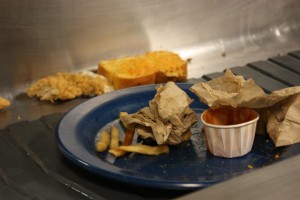In 2009, NMU Dining Services went tray-less in the Marketplace and the Wildcat Den. Since then, dining services has continued to implement initiatives focusing on sustainability through sourcing foods from locally owned businesses, creating minimal waste with served food and looking into different methods of sustainable practices.
Over the past five years, foods provided on campus, sourced from locally owned companies within a 400 mile radius of Marquette has increased from 18 percent to 38 percent.
“We’ve really made an effort to purchase local, to know the companies we’re purchasing from and to reduce waste in the kitchen,” Nathan Mileski, NMU’s corporate executive chef, said. “It’s been an adventure to say the least.”
Some of the difficulties that NMU dining faces in purchasing locally is the large amount of food necessary to serve over 6,000 meals each day, Mileski said.
After discussion of dining services purchasing local with farms and other eateries in the area, more local farmers have begun to reach out.
“Any time that we are purchasing something, we are looking to get something closer to us,” Stephanie Raboin, marketing manager at NMU Dining Services, said. “We work with Gordon Food Service to get a nearby report to find substitutes so that more of the products purchased can be within a 400 or 800 mile radius.”
Andrew Adamski, president of NMU’s Students for Sustainable Living organization, said he believes greater efforts can be made to produce more foods locally.
“Dining Services is doing a good job with distributors to reduce the amount of carbon inputted to get food to us, since its hard in the U.P. to grow all the food necessary to feed the students on campus,” Adamski said. “But it’s just small steps like getting community and student gardens on campus to grow the food distributed by dining services to increase sustainability.”
Currently, local companies and producers that dining services receive their food from include North Farm, a Michigan State University extension farm in Chatham, Mich., local livestock provided from members of the 4-H Youth Development Organization purchased from the Marquette County Fair, produce from the Hoop House, NMU’s solar greenhouse and Thill’s Fish House located in Marquette.
“The best thing that I have seen them do so far is increase their use of local foods,” Adamski said. “A lot of the greens and meats have been sourced locally, which is important in sustainability, but on the same note there’s still a lot of room for improvement.”
The lack of available fresh foods for students in the Market Place and Wildcat Den is an area Adamski believe could benefit from improvement.
“It would be nice to be able to pick from more fresh foods,” Adamski said. “Just the little things like that are what is going to make dining services on campus to be sustainable. You can’t do that without those little things.”
Lowering the amount of waste contributed by customers is another focus dining services has found necessary to become more sustainable.
“A lot of what we do for sustainable practices is behind the scenes, so we have to try to communicate our Dine Responsibly program, our local partners and the initiatives we have in place to our customers and the student body that they don’t see,” Raboin said. “In the Marketplace and Wildcat Den, it’s an all-you-care-to-eat facility, but taking excess and then wasting can add up if everyone does it.”
Combined with less waste, composting is a method that dining has begun looking into.
“Right now I know of no one collecting and separating 100 percent compostable materials in the local area,” Mileski said. “Even if we made everything compostable and put it into a compostable bag, the landfill still would process with the non-compostable.”
Mileski said a step that has been taken is moving towards more compostable liners and having compostable friendly disposable wares.
A compost plan would begin in the pre-composting stage with a focus on composting food scraps that are formed in the prep stages of cooking, while later looking into a post-compostable effort by composting the food waste produced by dining customers, Mileski said.
With continued efforts from diners and employees, NMU’s dining services looks to continue their sustainable efforts.





























